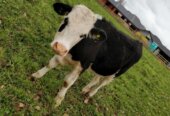
Getting their vaccinations in high-viz were, from left Shane Cassidy, Ngaire-Anne Steedman and Chase Purcell-Farrar watched by Moana Maniapoto and the nurse vaccinator.
Health vaccinators will go anywhere in Waipā to protect the community from Covid-19 in a strategy unveiled by Waikato District Health Board (DHB) this week.
The DHB will mobilise teams to do vaccinations at events where there are sufficient numbers – if they are asked.
And it’s Māori, aged 12-39, the DHB has in its sights as the percentage of the eligible population who have had their first and second Covid doses lags way behind non-Māori.
The DHB says it will go to marae, sporting and whānau events on request so everyone could get protected by Christmas.

Maree Munro
It is the largest vaccination campaign of its type in Waipā and saw the DHB and Raukura Hauora o Tainui heading out this week to Korakonui Community Hall, Mangatoatoa Marae and Crossroads Town Hall in Tokanui, Pirongia Memorial Hall and the Kio Kio United Sports Club in Otorohanga.
“We’re looking at how we get out into the community. We’re very open to meeting their needs, doing things that work for them. These are busy people so it’s about taking the vaccination service out to them,” said the DHB’s Covid-19 vaccine programme lead Maree Munro.
No appointment was needed at the community events as Munro revealed an opportunistic angle to getting vaccinated at other vaccination places too.
“Wherever you see a flag, just walk on in and see if you can get your vaccination done then and there.”
Nearly 75 per cent of Waipā’s eligible population had received their first dose at the start of the week but among the eligible Māori population of 6822 people, it was only 44.4 per cent.
“We’re hitting the hard-to-reach which is the 12-39 age group. That’s the numbers we’ve really got to target,” said Munro.
Pūniu River Care Inc, based at Mangatoatoa Marae south of Kihikihi, opened its pā for vaccinations on Tuesday.

Thumbs up from locals – Mere Te Huia and Shane Tamaki.
Cultural Well-Being pou tiaki Quinton Tunoho said the vaccination team was welcomed on to the marae at 10am and got straight into it.
“Some of our staff took the ‘plunge’ to get vaccinated and having the pop up here at the marae, also created a safe and comfortable space for the local community to get vaccinated,” he said.
Munro said the DHB had done things differently right from the start because Waikato was unique given its high Māori and rural population.
“We were with our kaupapa Māori right from the outset.”
 Kīngi Tūheitia played a leading role and combined with the principle of manaakitanga – kai manaaki greeted visitors and provided care and support – was hugely successful and resulted in kaumātua vaccination rates of nearly 90 per cent.
Kīngi Tūheitia played a leading role and combined with the principle of manaakitanga – kai manaaki greeted visitors and provided care and support – was hugely successful and resulted in kaumātua vaccination rates of nearly 90 per cent.
“Any event or opportunity that we could come and vaccinate, we’re very open to being contacted and asked to go,” said Munro.
“We’ve got mobile teams, everything all set up. We’ve got enough vaccinators. We’ll go to any sort of event – within the bounds of lockdown.”
And if that fails to work, the DHB will text or call. It has recruited Māori and Pacific staff to ring people up to discuss vaccinations.
“They are the peers of the people they are ringing,” said Munro.
“There’s lots of events going to be happening, like the Waka Ama nationals at Lake Karāpiro in January. We’re saying, at least be prepared so that if the events go ahead, you know you’re vaccinated, you’re ready to go. It’s about being ready for when the country gets going again.”









